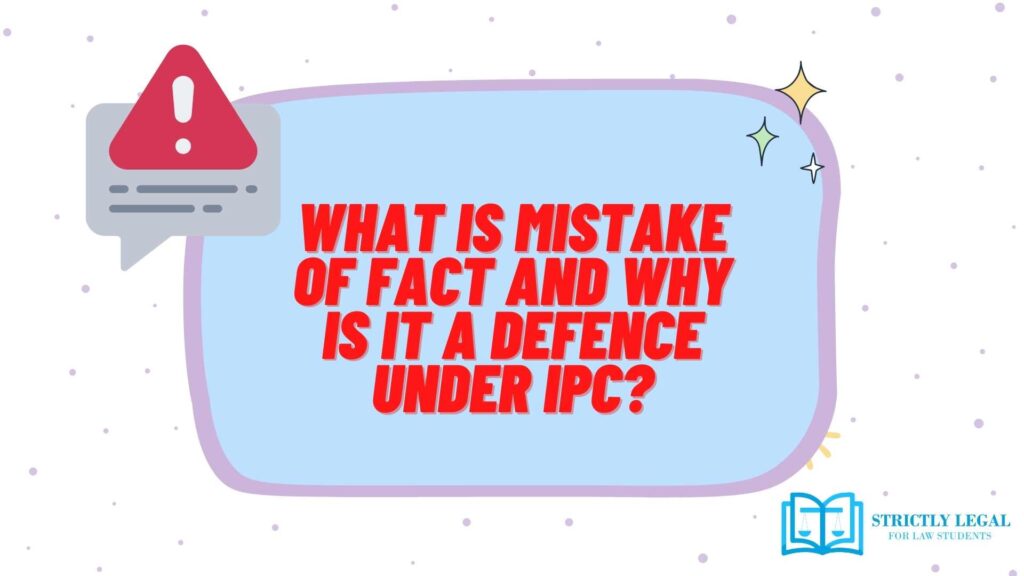Mistake of fact is one of the five general defenses or exceptions to criminal liability under the Indian Penal Code and it can be used to avoid liability of criminal nature for an offence. This blog post will explore the meaning of mistake of fact, what types there are, and how it can be used as a defence in India.
An Act resulting from mistaken facts of the situation can be said to come under the purview of “Mistake of fact”. The same can be categorized into types including but not limited to honest mistake, reasonable belief, unreasonable lack of care etc. If the said Act is an offense or not will depend on the facts of the each case.
Table of Contents
What is section 76, Indian Penal Code, 1860?
Section 76 in The Indian Penal Code76. Act done by a person bound, or by mistake of fact believing himself bound, by law.—Nothing is an offence which is done by a person who is, or who by reason of a mistake of fact and not by reason of a mistake of law in good faith believes himself to be, bound by law to do it.
Illustrations(a) A, a soldier, fires on a mob by the order of his superior officer, in conformity with the commands of the law. A has committed no offence.(b) A, an officer of a Court of Justice, being ordered by that Court to arrest Y, and, after due enquiry, believing Z to be Y, arrests Z. A has committed no offence.
Therefore, It maybe analysed as follows:
- An act done by a person bound by law in doing that or
- an act done by a person who believes himself to be bound by law in doing that
- the belief must be by reason of mistake of fact and not by reason of mistake of law
- the belief must be bona fide belief in good faith i.e he must believe in good faith.
If the above conditions are fulfilled one may plead in defense to any prosecution for any offense
What is Mistake of Fact?
“Mistake of fact” generally refers to a wrongful understanding by someone as to the facts of a situation—the mistake results in the person committing an illegal act.
Mistake of fact is a defense to a crime where the mistaken belief if it were true, would negate a mental state which is an element of crime.
In R v tolson, justice coke observed that an honest and reasonable mistake stands in fact on the same footing as absence of reasoning faculty as in infancy or perversion of that faculty as in lunacy.
In R v Tolson, the accused was convicted of bigamy. She had gone through a ceremony of marriage within seven years of marriage after she had been deserted by her husband. She believed in good faith and on reasonable grounds that her husband was dead. It was held that a bona fide belief on reasonable grounds in the death of the husband at the time of her second marriage afforded a good defense to the charge of bigamy.
Recommended Books of IPC:
Why is mistake of fact a defence?
Mistake is a defense because when an act is done by reasons of mistake of fact, mens rea necessary to constitute a crime is absent or is negatived.
What are the exceptions? ( situations when mistake of fact cannot be pleaded as a defense)
- Cannot be pleaded when responsible enquiry would have elicited true state of facts.For example when a person marries on a honest belief that his previous marriage has been dissolved by a decree from the court, however the decree has not been granted. He is liable for bigamy because there was no reasonable inquiries made and if made would elicited true state of his marriage,
When the act is penalized by statue without reference to the mind of the wrong doer.
For example, selling adulterated foodstuff has been made an offense under the Prevention of Food Adulteration Act, 1954. In case of any prosecution, it shall be no defense that the seller was ignorant of the nature of the product he was selling. As the act ( of selling adulterated food) is itself illegal without having to prove any mens rea on the part of the seller
Meanings :
- adulterated: Transform into something poorer in quality by adding another substance
eg: “the brewer is said to adulterate his beer” - Mens rea: Guilty mind
Ignorantia facti excusat, ignorantia legis neminem excusat
This is a well-known maxim of criminal law which states Ignorance of fact is an excuse while ignorance of the law is no excuse.
What is mistake of law?
Mistake of law means mistake as to the existence of law or otherwise of any law on a particular subject as well as mistake as to what law is.
Austin gave two reasons in support of the argument as to why ignorance of law is not excused. One is if ignorance of law is admitted as a ground for defense, the courts will be involved in question which it would scarcely be possible to solve and therefore would would lead the administration of justice next to impracticable. Secondly, ignorance of law would always be pleaded as a defense and the court would have to prove every time whether the party was really ignorant of the law.
Specifically, mistake of law can be used as a defense in four limited circumstances(source):
- When the law has not been published;
- When the defendant relied upon law or statute that was later overturned or deemed unconstitutional;
- When the defendant relied upon a judicial decision that was later overruled; or
- When the defendant relied upon an interpretation by an applicable official.
What does section 79 of IPC state?
The Indian Penal Code is a criminal law which aims to protect citizens from criminal Acts by imposing penal liability.
This section of the post will examine section 79 of the IPC in detail and provide insight into what this particular section means.
79. Act done by a person justified, or by mistake of fact believing himself justified, by law.—Nothing is an offence which is done by any person who is justified by law, or who by reason of a mistake of fact and not by reason of a mistake of law in good faith, believes himself to be justified by law, in doing it.
Illustration A sees Z commit what appears to A to be a murder. A, in the exercise, to the best of his judgment exerted in good faith, of the power which the law gives to all persons of apprehending murderers in the fact, seizes Z, in order to bring Z before the proper authorities. A has committed no offence, though it may turn out that Z was acting in self-defence.
Ingredients:
- An act done by a person under mistake of fact
- Mistake must related to a fact and not law
- Mistake must be on bona fide and reasonable grounds.
- The person doing the act is either justified by law or believes himself to be justified by law in doing the act.
Interrogating a person carrying allegedly stolen property
The accused, a police constable interrogated a person, moving in the early morning with three pieces of cloth under his arm, on the suspicion that he was carrying stolen property. Not getting a satisfactory reply from him and on being refused inspection, he arrested him. The Inspector, however, released him. The High Court set aside the conviction on the ground that the accused had acted in good faith under mistake of fact under section 79 of the Code. His good faith was apparent when he started questioning the person with a view to know about the truth of the matter
Aren’t section 76 and 79 of IPC same?
Well, to some extent.
Section 76 of the Indian penal Code deals with situations where a person is under a mistaken belief that he is BOUND by law to do some act but in section 79 the person is under a mistaken belief that he JUSTIFIED by law in doing an act.
One is a legal compulsion and the other is a legal justification.

Passionate about using the law to make a difference in people’s lives. An Advocate by profession.







